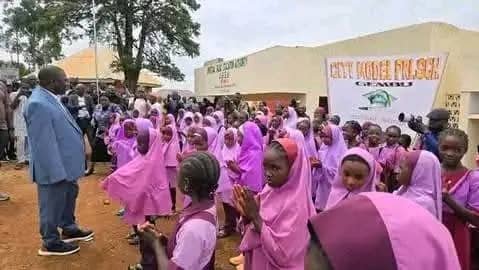Kefas’s tough road: Between vision and people’s expectations
Kefas’s tough road: Between vision and people’s expectations
By Sylvanus Viashima, Jalingo
On a sweltering afternoon in Bali, little Hauwa squeezed herself between two classmates on a broken bench, clutching a worn-out exercise book. The teacher’s chalk screeched on a cracked blackboard as more children peered in from the windows, desperate not to miss the lesson. For Hauwa’s parents, who could barely afford school fees two years ago, this scene is a miracle. For her exhausted teacher, it is both a blessing and a burden.
“This is the first time all my children are in school together,” said Hauwa’s mother, Aisha Musa, a petty trader. “Before, I sent only the eldest and prayed the others would learn later. Now, even if they sit on the floor, at least they are learning.”

But her daughter’s teacher, Mr. Joseph Emmanuel, has a different worry. “We now teach almost double the number of pupils we used to have,” he said, wiping sweat off his brow. “I love that children are coming, but without more teachers and books, we may be creating hope that is hard to sustain.”
This is the new face of Taraba under Governor Agbu Kefas: hope colliding with strain. Since declaring free and compulsory education in July 2023, enrolment across the state has soared. Parents rejoice, children are eager, but classrooms are bursting, teachers are stretched thin, and books are scarce. It is one of the clearest symbols of Kefas’s reforms bold in vision, but heavy with challenges.
The governor came into office promising to reset Taraba. A retired army officer with a reputation for discipline, he quickly moved to digitise land records through the Taraba Geographic Information Services (TAGIS), ending decades of missing files and shady facilitators at Jalingo’s registry.
“I went to get a land certificate last month, and it was like magic compared to before,” said Ibrahim Adamu, a young civil servant in Jalingo. “No one asked me for extra money, no files missing. If they keep it up, it will change things.”
Kefas also trimmed ministries, restructured agencies, and unveiled a 25-year development master plan with promises of agro-processing plants, hydropower projects, and modern infrastructure.
In health, he reopened and equipped primary healthcare centres, deployed mobile clinics, and strengthened maternal-child health programmes. In agriculture, farmers have received subsidised fertilisers and training in irrigation and climate-smart methods, while pilot agribusiness schemes in Lau and Karim Lamido offer hope beyond subsistence farming.
Women and youth have also had a share. “The small loan I got from the women’s microcredit scheme helped me expand my pepper business,” said Janet Nyanayo, a market woman in Wukari. “It may not be big money, but it saved me from borrowing at high interest.”
Yet for every reform that glitters, a rough edge protrudes. Free education shines but risks collapse without enough classrooms, teachers, and materials. The civil service, long riddled with ghost names and patronage, remains a stumbling block despite attempts at electronic payroll reform.
Read Also: ‘It’s Nothing Personal, I’ll Support Atiku Over Wike For…
“We hear of ghost worker verification every year,” grumbled a mid-level officer at the Ministry of Works, who asked not to be named. “But the big men’s lists never change. It’s the small workers who suffer delays.”
New agencies multiply but threaten to drain resources in a state already battling a heavy wage bill. Even peace efforts, institutionalised in the Bureau for Peace and Conflict Management, struggle with thin funding in communities scarred by ethnic clashes.
Kefas knows his gamble is risky. Taraba is a land of promise, fertile plains, roaring rivers, mineral wealth, but also of deep ethnic divisions and fragile institutions. Every governor before him pledged transformation; most left little more than abandoned projects and dashed hopes. By targeting foundations instead of facades, Kefas has chosen the harder path.
But the people are impatient. Activist Omoyele Sowore’s recent outburst, dismissing Kefas as “an unserious leader,” a comment that has since been condemned in Taraba, but it struck a nerve. Citizens want more than blueprints, they want results they can feel.
Still, the administration is responding. To ease the pressure of free education, 61 new schools are being built with hydraform block technology, while the Taraba State Universal Basic Education Board is set to renovate, reconstruct, and equip existing schools with learning materials.
Today, the servers at TAGIS hum, classrooms creak under the weight of eager learners, and clinics in remote areas flicker with new life. Between dreams and delivery lies the thin rope on which Kefas balances; determined to reset Taraba even if it means stepping on toes. Whether history records him as a reformer who dared, or another dreamer swallowed by the system, will depend on how firmly he walks that rope.

